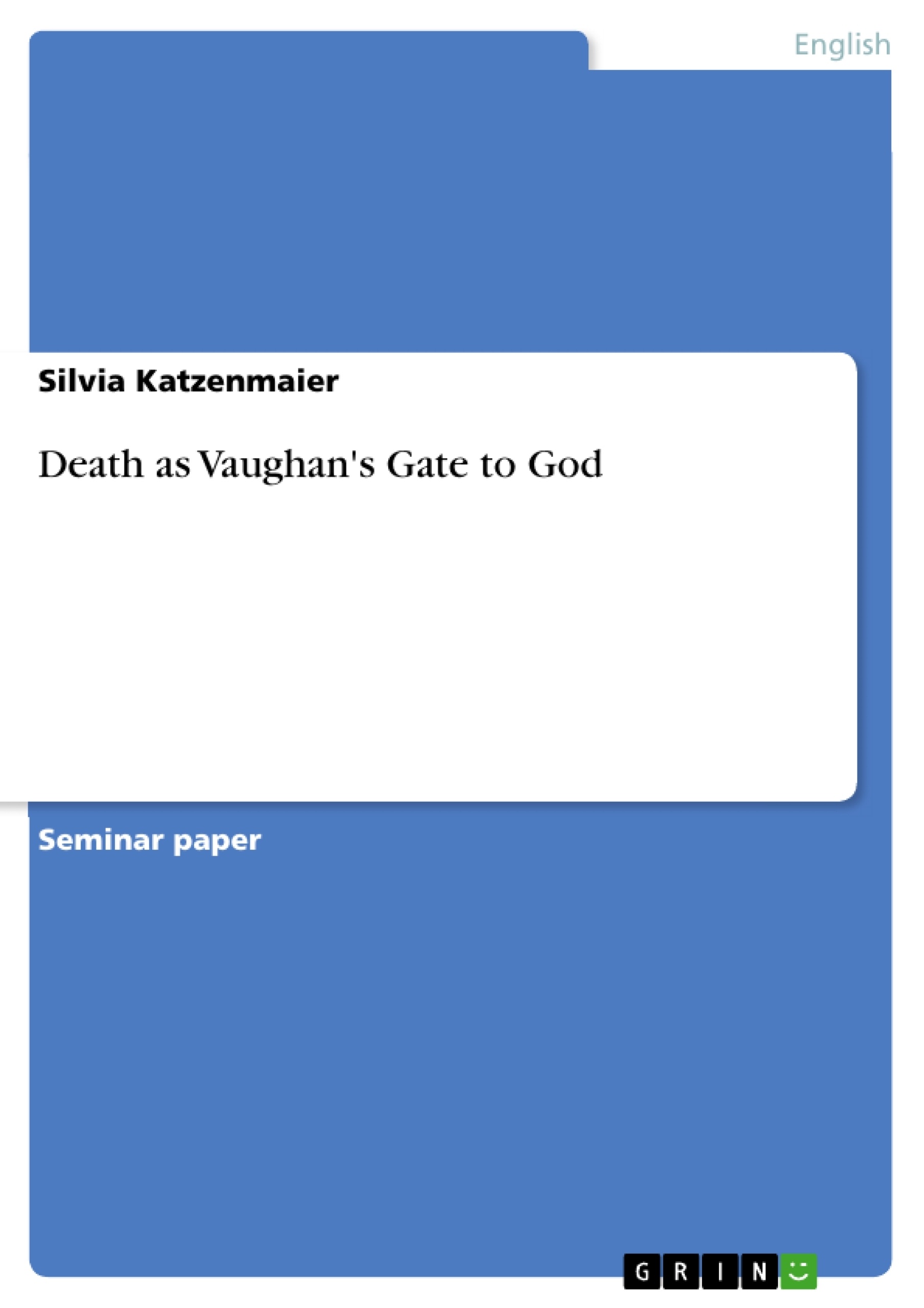This paper will discuss the role of death in three poems of the Welsh metaphysical poet Henry Vaughan, who lived from 1621 to 1695. Among other things quotations from critics such as the one from David Reid: “As a visionary, Vaughan is a poet of death.” (179) and the frequent appearance of the preoccupation with death in Vaughan’s poems show the importance of death in the works this metaphysical poet. In the seventeenth- century it was a common Christian belief that life meant separation from God and that only death was able to bring man in front of God, so that after life the soul of man could exist in the presence of Him. Death at that time was also seen as the leveller of pride and as the breaking of the beauty as the motifs “carpe diem” and “memento mori” show. The reason for the author of this paper to choose this special topic was Vaughan’s beautiful and overwhelming way to describe his longing for death. This kind of longing suggests that Vaughan loves death. The task of this paper is to demonstrate this attitude of Vaughan towards death with the help of the interpretation of three of his poems, so that the author of this paper in the end has answered the question: Does Vaughan see death as the gate to God? This paper will discuss the poems “They Are All Gone into the World of Light!”, “The Water- fall” and “The Night”. Every poem will be interpreted with a focus on death and after that the author of the paper will explain what death means for Vaughan depending on the poem. The writer would like to mention that in literature the poems of Vaughan are rarely analysed with the focus on death. Because of that the author of the paper discussed the poems mainly by herself.
Inhaltsverzeichnis (Table of Contents)
- 1. Introduction
- 2. Death as Vaughan's Gate to God
- 2.1. They Are All Gone into the World of Light!
- 2.2. The Waterfall
Zielsetzung und Themenschwerpunkte (Objectives and Key Themes)
This paper explores the concept of death in three poems by Henry Vaughan, a Welsh metaphysical poet, and analyzes the relationship between death and the divine in his work. It aims to answer the question of whether Vaughan views death as a gateway to God.
- The role of death in the poetry of Henry Vaughan
- Vaughan's longing for death as a release from mortal life
- The significance of light and darkness as symbolic representations of life and death
- The spiritual implications of death and its connection to God
- The influence of religious beliefs on Vaughan's understanding of death
Zusammenfassung der Kapitel (Chapter Summaries)
The paper begins by providing an introduction to the topic, outlining the central argument and its relationship to the broader context of seventeenth-century religious beliefs. The first chapter analyzes "They Are All Gone into the World of Light!", exploring the poem's themes of death, heaven, and spiritual longing. The author examines the poem's structure and language, focusing on the imagery of light and its connection to the idea of eternal life. The chapter concludes by analyzing Vaughan's attitude towards death and the extent to which he sees it as a gateway to God.
Schlüsselwörter (Keywords)
The key themes and concepts explored in this paper include: death, metaphysical poetry, Henry Vaughan, religious beliefs, spiritual longing, heaven, God, imagery, language, symbolism, and interpretation.
Frequently Asked Questions about Henry Vaughan’s Poetry
How does Henry Vaughan perceive death in his poems?
Vaughan often views death not as an end, but as a "gate to God" and a release from the separation between man and the divine that characterizes mortal life.
What are the key poems analyzed regarding the theme of death?
The paper focuses on three major works: "They Are All Gone into the World of Light!", "The Waterfall", and "The Night".
What symbols does Vaughan use for life and death?
Vaughan frequently uses imagery of light (representing heaven and the divine) and darkness (representing the mortal world or the transition of death).
What is the "metaphysical" aspect of his poetry?
As a metaphysical poet, Vaughan uses complex metaphors and spiritual longing to explore the relationship between the physical world and the eternal soul.
Why does Vaughan seem to "long" for death?
His longing stems from the belief that only after death can the soul truly exist in the presence of God, making death a beautiful and desirable transition.
- Quote paper
- Magistra Artium Silvia Katzenmaier (Author), 2002, Death as Vaughan's Gate to God, Munich, GRIN Verlag, https://www.grin.com/document/144487



